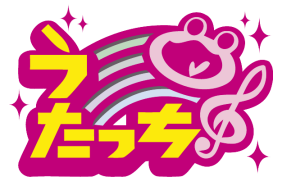Utacchi
| Utacchi | |
|---|---|
 | |
| Developer(s) | Konami |
| Publisher(s) | Konami |
| Director(s) | Yuuta Watabe |
| Producer(s) | Yoshihiko Ota |
| Composer(s) | Daisuke Kurosawa, Osamu Migitera |
| Series | Pop'n Music |
| Platform(s) | Nintendo DS |
| Release |
|
| Genre(s) | Music rhythm game |
| Mode(s) | Single player, multiplayer |
Utacchi (うたっち) is a music video game developed and published by Konami for the Nintendo DS in 2010. It was released exclusively in Japan under the Pop'n Music series. The game plays with the system held in "book style" as the player interacts with falling notes using the stylus. The name 'Utacchi' is a portmanteau of the Japanese words "uta", meaning 'song', and "tachi", a loan word from English meaning 'touch'.
Gameplay
Utacchi plays like other Bemani games, where notes travel down lanes into a judgement area. When the note reaches the center of the judgement area, one of four actions must be taken based on the note's color:
| Note Color | Note Description |
|---|---|
| Red | The note is tapped. |
| Yellow | The note is tapped immediately followed by an upwards flick. |
| Blue | The note is held for its duration. |
| Green | The note is held and the stylus is rubbed vertically for its duration. |
To pass a song, the player must finish with at least 2/3 of the life bar full. As in other rhythm games, this is raised by hitting notes in time with the music. There are three timing grades: Good, Okay, and Boo. The first two will raise your life bar, while the last will deplete it.
Difficulty
The number of lanes possible are 1, 3, and 5. On 1 and 3 lane mode, there are two sub-difficulties, Simple and Difficult. 5 lane mode can only be played on Difficult.
Game Modes
Normal Play uses the gameplay listed above. Each note is part of the vocal track.
Vocal Play uses the same game play as above but player recorded audio replaces the vocal track. It is pitch shifted to match the song.
Karaoke uses the microphone to detect when the player is singing. "Konami Brings Bemani To The DS With Utacchi!!". Siliconera (published 2010-05-05). 5 May 2010. Retrieved 2022-08-11. Judging is based on the presence of sound, not on pitch. Karaoke uses the 5 lane notechart.
Track listing
The following songs are unlocked at the beginning of the game:
| Song | Artist | TV Show/Game |
|---|---|---|
| Genesis of Aquarion (創聖のアクエリオン, Sōsei no Akuerion) | Akino | Genesis of Aquarion |
| Dreamin' | ||
| Anpanman March (アンパンマンのマーチ, Anpanman no Machi) | Anpanman | |
| Cloudy Skies (曇天, Donten) | DOES | Gintama |
| My First Kiss (はじめてのチュウ, Hajimete no Chū) | Anshin Papa | Kiteretsu Daihyakka |
| Locolotion (ロコローション, Rokorōshon) | ORANGE RANGE | |
| A Cruel Angel's Thesis (残酷な天使のテーゼ, Zankoku na Tenshi no Tēze) | Yoko Takahashi | Neon Genesis Evangelion |
| Dancing Pompokolin (踊るポンポコリン, Odoru Ponpokolin) | B.B.Queens | Chibi Maruko-chan |
| Blue Bird (ブルーバード, Burūbādo) | Ikimonogakari | Naruto Shippuden |
| Sky-Blue Days (空色デイズ, Sorairo Deizu) | Shoko Nakagawa | Tengen Toppa Gurren Lagann |
Multiplayer
Up to 4 people can play together using link play or download play.
References
- ^ "お菓子の国を舞台にしたDS用リズムアクションゲーム「うたっち」,KONAMIより本日発売". 4Gamer.net. Archived from the original on 2012-11-13. Retrieved 2022-08-11.
